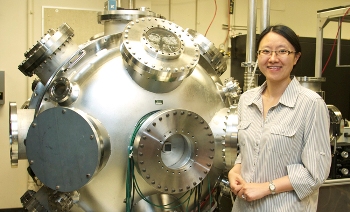Lawrence Livermore National Laboratory (LLNL) physicist Yuan Ping has been selected as a recipient of a Department of Energy Office of Science Early Career Research Program (ECRP) award. These awards provide $2.5 million over five years to support the development of individual research programs of outstanding scientists early in their careers and stimulate research careers in disciplines supported by the DOE Office of Science.
 Yuan Ping stands next to the target chamber in the Europa laser bay, part of the Jupiter Laser Facility.
Yuan Ping stands next to the target chamber in the Europa laser bay, part of the Jupiter Laser Facility.
"I am very honored and grateful for this great opportunity to do more high-quality work," Ping said. Her project, selected by the Office of Fusion Research, aims to provide high quality data on critical energy transport properties of high-energy-density (HED) matter. According to Ping, transport processes, such as thermal and electrical conduction, radiation, viscosity, electron on equilibration and particle stopping, determine the mechanisms and rates of energy transfer and redistribution within HED matter.
"These energy partition pathways must be properly diagnosed and understood in order to develop and benchmark next-generation advanced models for extreme HED conditions such as those found in inertial confinement fusion," she explained. The data also will impact many other fields where HED science plays a crucial role, such as studies of geophysical phenomena, planetary formation and astrophysical objects.
At present, very little data exist in the relevant regimes because these extreme conditions are difficult to create and to measure, resulting in uncertainties in modeling and simulations. A suite of recently developed novel X-ray and optical techniques makes it possible to do these challenging measurements. The experiments will be performed at multi-scale facilities, including Jupiter Laser Facility at LLNL, Advanced Light Source at Lawrence Berkeley National Laboratory, Linac Coherent Light Source at SLAC National Accelerator Laboratory and OMEGA at the University of Rochester's Laboratory for Laser Energetics.
This year, there were 61 ECRP awardees at universities and national labs selected from a pool of about 770 applicants. LLNL has an established history of researchers receiving this honor -- Ping is the 10th recipient since the program's inception in 2010.